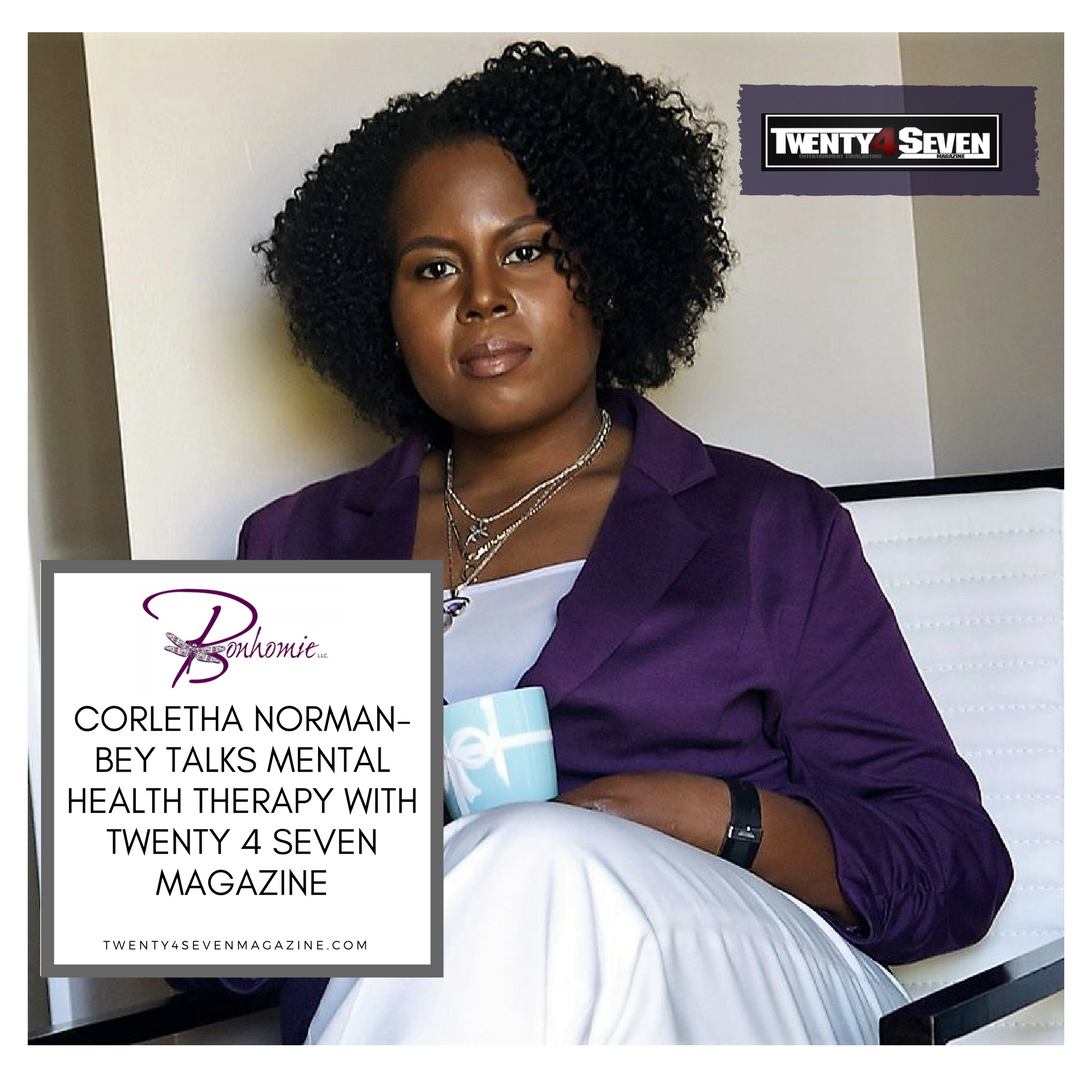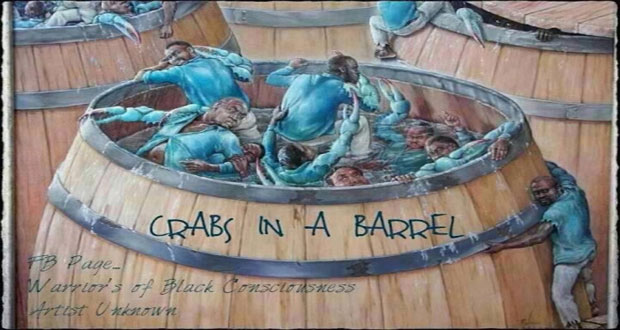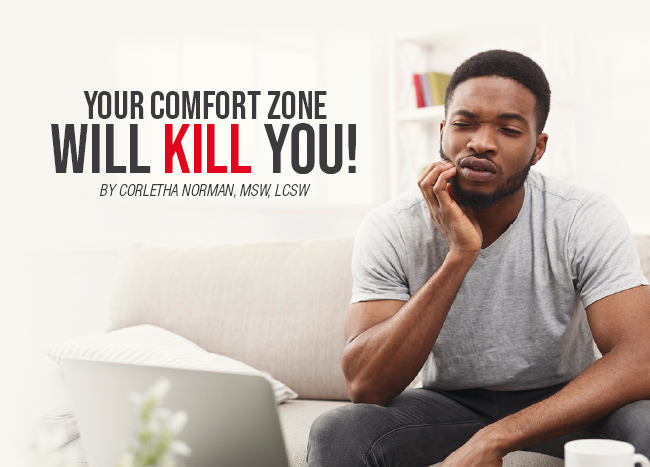
Twenty4Seven Magazine: Corletha Norman Bey talks Mental Health Therapy and Introduces Bonhomie, L.L.C.
Corletha Norman Bey, Owner and Clinical Director of Bonhomie, L.L.C. was interviewed by staff of Twenty4Seven magazine, with a portion of the interview being published October 15, 2017. Please continue reading below for the full interview.
- How and where did you grow up?
- I grew up on the state line of Tennessee and Kentucky in a small town called Oak Grove.
- There is a military base in the area. Were you a military brat at all? What did you learn from those who were?
- My dad was in the Army and retired out of the 101st Airborne Division. From a child’s point of view I learned that despite our differences, we all had so much in common. I also learned that there are many ways to add two numbers to equal 10. I’m not speaking of just math when I say that. I applied that logic to a lot of things growing up.
- Where did you attend college?
- I attended The University of Louisville for undergrad and Spalding University for my graduate degree. Both are in Louisville, KY.
- What was the experience like?
- The experience in both schools was essential for my growth. There are many times that I look back at some of the situations and circumstances that I was in with 20/20 hindsight. It all makes much more sense now than it did when I was going through. With Louisville, I left home so that I would have an opportunity to grow into my own person. I accomplished that. With Spalding, I wanted to determine a way to take my own experiences and use them as tools to help others. I accomplished that as well.
- What is the biggest lesson you learned while in attendance?
- Not to allow others to define my path in life for me.
- Tell us a little bit about, “Bonhomie”. What does the name mean?
- Bonhomie: cheerful friendliness; frank and simple good-heartedness; a good-natured manner; geniality. I chose Bonhomie as the name of my practice to combat the serious, anxiety causing stigma attached to therapy and mental health. Not all therapists are cold, monotone, dull, or trying to make you drink the kool-aid. The way that we, well social workers as a whole, are stereotypically portrayed on television is not an accurate account of the profession in its entirety. I for one realized my own lack of knowledge of the profession once I became a part of it. I knew that I would have to work to combat the stigma; particularly due to my desire to address mental health concerns of the black community. While I am open to working with anyone ages 12 and above of any background, I’m focusing on working with teenagers followed by young adults. I am providing individual, family, and couples therapy. I will be providing therapy surrounding trauma/PTSD, men’s issues, women’s issues, cultural issues, adjustment, divorce/custody/family issues, spiritual concerns, life transitions, and more. Please see my website for a complete list of specializations.
- What made you want to start your own company?
- Honestly, I grew tired of watching my back and watching my licenses. I have never worked one or two days for so many places in my life! Georgia is a state full of hustlers. With the low end of that mentality, some of these agencies will do and allow anything to occur for a few dollars. In some instances, they will take on a corporate approach to meeting client needs. There will be a heavy focus on numbers and dollars, which allows for quality care to fall further down on the list of priorities. I also did not feel supported in some of the positions I was in. Finally I wanted the opportunity to work more heavily with populations that mean a lot to me. When working for others, you don’t always have control over who you get to work with.
- What does your day consist of, professionally?
- Right now I rise and go to job one working with adults with pervasive mental health disorders in a day program. I leave there and go to job two working with DFCS referred clients. I assist them therapeutically with bringing closure to their DFCS cases to regain/maintain custody of their children.
- Overall, do you believe the topic of mental health in the black community is taboo? Why or why not?
- I do. The black community has been conditioned to not show weakness of any kind. So much so that a child can’t be too sure that their parents will believe them if they admit they were molested. It amazes me at times what is perceived to be a weakness.
- When soldiers come back from war, often they suffer from PTSD. What is PTSD and do you believe black people growing up in poverty stricken areas can suffer from those same symptoms? Why or why not?
- PTSD stands for Post-Traumatic Stress Disorder. To summarize, it is when an individual continues to suffer from multiple debilitating symptoms that can vary for a period of time following experiencing trauma. While I salute all that the various branches of the Armed Forces do for us, they are not the only individuals that can be diagnosed with PTSD. I have diagnosed a few children with it myself. Yes blacks surviving in poverty can suffer from the same symptoms and diagnosis. Many individuals that I have worked with in areas like what you have described, the West End of Louisville for example, describe their own living conditions as that of a war zone. Resources are scarce, violence and the possible loss of life is prevalent, and the crab in a barrel mentality allows for individuals to be taken out by their neighbor turned enemy.
- What effects does living in 1 parent households have on boys? How about girls?
- They lack balance. This does not matter if they are in single father or single mother homes.
- What is “Cognitive Dissonance”? Can you give us an example?
- It is defined as, “the state of having inconsistent thoughts, beliefs, or attitudes, especially as relating to behavioral decisions and attitude change.” Cognitive Dissonance is a noun utilized in the mental health world to describe a state when mental harmony lacks, and an individual creates an illusion to reinstate harmony. It normally shows in a person in two ways: being dismissive or being on the fence.With being dismissive an individual would refuse to acknowledge or take accountability for contradictory beliefs or actions. For example, a person could believe their lack of success in life is caused by growing up in the system. On the other hand they won’t acknowledge that they flunked out of college for turning up too much. With being on the fence, a person will attempt to exist on both sides of a situation. Half of your mental being hangs on one side of the fence, while the other half of your being hangs on a contradictory side of the fence. For example an individual could secretly be in an abusive relationship, but urge and assist a loved one to leave their abusive relationship. I see cognitive dissonance a defense mechanism. The dissonant individual is trying to protect themselves from something. They may not want to change, hurt, be honest with themselves, be vulnerable, etc.
- What kind of advice would you give college students who are pursuing the mental health field?
- I would say to have a decent idea of what you want your end product to be. After that, do your research to determine what is necessary to get there. For example, if I would have known what direction I wanted to take from the start, I could have earned my master degree in one year instead of two.
- Are there any specific volunteer programs or internships for college students to get involved in?
- The average program will have built relationships with various community partners to allow the students to gain intern experience while in school. They should speak with the appropriate university personnel to determine the specific requirements surrounding their program. If they just want to volunteer in addition to, I speak very highly of Big Brothers Big Sisters. I was a Big for many years in Kentucky, and have encouraged others to be Bigs as well. Besides that, just ask. There are many various organizations out and about that would love the help! That is another area where an individual could even create their own volunteer opportunity where they see a need that isn’t being met.
- Besides Stherapy, what else could someone in your field get into?
- So many things. Grass roots organizing, court/legal advocacy, guardianship, research, administration, teaching at the university level, school social work, medical social work, mental health case management, prison system, various faith based endeavors, creating new programming/agencies surrounding particular areas of need, etc. The field of Social Work is very forgiving and open to new ideas. If a person has an idea that does not yet exist, they will likely have the space and opportunity to create it in the field of Social Work.
- Are therapists more prone to listening over talking?
- If your therapist talks more than you in your session…honey you may need to re-think your therapeutic relationship.
- Do you “give advice”? Are you allowed to?
- I give friendly advice to friends and family that come to me looking for a free therapy session. That I am allowed to give. With clients I am unable to advise; as it is a legal term that would require me to practice law. Given certain circumstances, I am able to give recommendations. Yet and still, I am very careful with recommendations due to possible legal implications that could arise.
- You’ve recently relocated to Atlanta. What is the difference between there and Louisville?
- The largest difference is that people that look like me are EVERYWHERE! In Kentucky I was used to be the only or one of few people of color in any place at any time. It was a bit of a culture shock for me funny enough. There are more things to do for fun and entertainment. There is an abundant offering of plant based eateries in Atlanta. While I don’t use it regularly, I enjoy the Marta system in comparison. I some days randomly hop on the train and ride to enjoy the people of the city. Atlanta is a city where a lot of black people are thriving. Why do you believe this is happening?
- Is there any event that happened in your life that caused you to have an epiphany that changed your perspective on the world? What happened?
- Yes! I was VERY young, 5 at most when I started questioning the world. Questions about prayer and Jesus at the Tabernacle being hushed; or seeing a Moor with Columbus in my textbook in the 4th grade. I still remember being told the Moor was a slave, and retorted stating that couldn’t be since the Moor was so well dressed. The funniest was Santa. I lived in Pierce Village on Sable at the time. I remember inquisitively asking how he was making his way into our house since we didn’t have a chimney. I was told he came in through our back porch door. At that point I was like hold on…I got questions because yall don’t even leave the back gate unlocked ever. Let’s just say I knew the truth in Kindergarten.
- What does the term, “being woke” mean to you? Are you “woke”?
- To me, being woke to me is seeing the world at play from a macro view versus a micro view. From that macro view, then being able to put 2 and 10 together to see how it all come together to equal 12. Then taking it a step further to see how it breaks down to your micro view of 3. I would say that I am woke, just in my own way.
- Name one thing you’ve learned over the years about our people that majority of us don’t know.
- I won’t say that majority of us don’t know this, but this is very prevalent amongst many of us. We don’t know our own potential. I am speaking of individual potential. I meet SO many great people, and see the beauty in them and their capabilities. It is disheartening for me to realize over and over again that they don’t see what I see.
- Who is Corletha outside of “work”?
- A food and music loving child of the earth who appreciates a good festival. There I can wear all of my “weird” clothes and be a part of the various elements.
- Are you single or married?
- I am single…for now (lol).
- What are black men’s biggest problem when it comes to relationships? Why is that?
- I think this is an unfair question, so I am going to answer it a bit differently than asked. I think that the largest problem for black men and women is ego or self-concept; whichever a person would prefer to name it. So much has happened over the years to take the black man and woman out of their proper places in their partnership with the other. The problem is, neither of the two is willing to give into the other due to possible affects to their egos/self-concepts. No one wants to be hurt and everyone fears. There are too many things that account for these fears and hurts to name, but love just isn’t the same anymore. I urge my folks to come to know what they need out of love and can give in love. Once you figure that out, put it into action with everyone you have any sort of relationship with. Be what you want to see.
- Do you “read” your potential mates? If so, isn’t that unfair?
- By “read” if you mean read for filth; only when necessary (lol). I’m just picking and playing. I figure you mean analyze. If so yes. I don’t find it unfair as I am analyzed as well. Many men get the wrong idea of me, but they had to analyze me to assume that I must be one way or another.
- Give us a fact about yourself that is unknown to most people.
- I started out attending college to be a Registered Nurse. I flunked out of nursing school because it wasn’t what I really wanted to do. I just kept moving through the program to make my mom happy.
- Considering the state of our country at the moment, what can black people do to improve the conditions of our people?
- Let go of ego. Ego causes way too much conflict. We don’t have time to keep mulling over these petty power and ego driven arguments. Know your role in the overall well-being of our community and play your part well.
- What is your ultimate goal in life?
- To activate so much of me that my children have the ultimate head start in picking up where I leave off. By children, I am not only speaking of the ones I will birth in the near future. I’m also speaking of all young and old that I am gifted the opportunity to enrich at varying times in their lives.
- How can people contact you for your help?
- If for therapy I can only assist those residing in Georgia and Kentucky at this point. If for spiritual work, anyone can reach out. I can be reached by email at info@bonhomiellc.com. Also I can be followed on Instagram and Facebook at Bonhomiellc.
- Any last words?
- Autonomy and compassion. Look them up. Peace love and light.
No Comments
Leave a reply
You must be logged in to post a comment.



